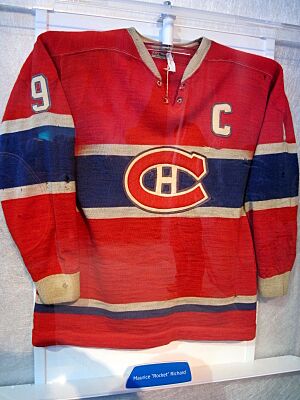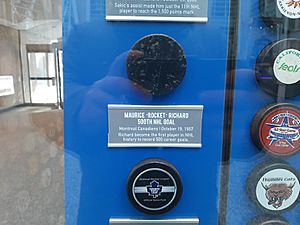Maurice Richard facts for kids
Quick facts for kids The HonourableMaurice Richard PC CC OQ |
|||
|---|---|---|---|
| Hockey Hall of Fame, 1961 | |||
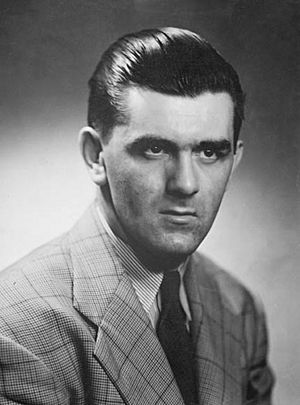
Richard in the 1940s
|
|||
| Born | August 4, 1921 Montreal, Quebec, Canada |
||
| Died | May 27, 2000 (aged 78) Montreal, Quebec, Canada |
||
| Height | 5 ft 10 in (178 cm) | ||
| Weight | 180 lb (82 kg; 12 st 12 lb) | ||
| Position | Right wing | ||
| Shot | Left | ||
| Played for | Montreal Canadiens | ||
| Playing career | 1942–1960 | ||
Joseph Henri Maurice "Rocket" Richard was a famous Canadian ice hockey player. He played 18 seasons in the National Hockey League (NHL) for the Montreal Canadiens. He was the first player in NHL history to score 50 goals in one season. He did this in just 50 games during the 1944–45 season. He was also the first player to reach 500 career goals.
Richard stopped playing in 1960. At that time, he was the league's all-time leader in goals with 544. He won the Hart Memorial Trophy in 1947, which is given to the NHL's most valuable player. He played in 13 All-Star Games. He was also named to the NHL's best teams 14 times. In 2017, Richard was named one of the 100 Greatest NHL Players ever. His younger brother, Henri, also played for the Canadiens. They were teammates for Maurice's last five years. Henri, nicknamed the "Pocket Rocket," is also in the Hockey Hall of Fame.
Richard, Elmer Lach, and Toe Blake formed a powerful scoring group called the "Punch Line" in the 1940s. Richard helped the Canadiens win eight Stanley Cup championships. This included a record five wins in a row from 1956 to 1960. He was the team's captain for the last four of those wins. The Hockey Hall of Fame quickly inducted Richard in 1961, without the usual five-year wait. In 1975, he joined Canada's Sports Hall of Fame. The Canadiens retired his jersey number, 9, in 1960. In 1999, they created the Maurice "Rocket" Richard Trophy. This award is given each year to the NHL's top goal-scorer.
Maurice Richard was the oldest of eight children. His family was very poor during the Great Depression. He was first seen as a player who got injured easily. He couldn't join the Canadian military during World War II because of his injuries. Richard was known for playing with great passion and sometimes getting into fights. In 1955, he was involved in a serious incident on the ice. He hit an official, and the NHL President, Clarence Campbell, suspended him for the rest of the season and playoffs. This led to the Richard Riot in Montreal. This event is often seen as an important moment in Quebec's history. Richard was a hero to French-speaking people in Quebec. His story is a main part of Roch Carrier's famous short story, The Hockey Sweater.
In 1998, Richard was diagnosed with abdominal cancer. He passed away from the disease two years later. He was the first person who was not a politician to be honored with a state funeral in Quebec.
Contents
Early Life and Hockey Beginnings
Joseph Henri Maurice Richard was born on August 4, 1921, in Montreal, Quebec. His father, Onésime Richard, was a carpenter. The family struggled during the Great Depression. Maurice was the oldest of eight children.
Richard got his first ice skates when he was four years old. He grew up skating on local rivers and a small ice rink his father made in their backyard. He didn't play in organized hockey leagues until he was 14. Instead, he played informal games like "shinny" and "hog." In "hog," one player tried to keep the puck away from everyone else for as long as possible. Hockey was his favorite sport, even though he also played baseball and was a boxer. When he started playing in leagues, Richard sometimes used fake names like "Maurice Rochon." This helped him play on more than one team, which wasn't allowed. In one league, he led his team to three championships in a row. He scored 133 of his team's 144 goals in the 1938–39 season.
At 16, Richard left school to work with his father as a machinist. He also went to a technical school to learn a trade. When he was 18, Richard joined the Verdun Juniors. He didn't play much in his first season. He scored four goals in ten regular season games. He added six goals in four playoff games as Verdun won the provincial championship. In 1940, he moved up to the Montreal Canadiens' minor league team. But he broke his ankle in his first game and missed the rest of the season. This injury also stopped him from joining the Canadian military in World War II. He was told he was not fit for combat.
Off the ice, Richard was a quiet young man. He met his future wife, Lucille Norchet, when he was 17. She was almost 14. Lucille was the younger sister of one of his teammates. Her bright personality was a good match for Richard's quiet nature. Lucille was very good at helping him through tough times in hockey and in life. They got engaged when he was 20. They married on September 12, 1942, when she was 17.
Playing Career Highlights
First Stanley Cup Win
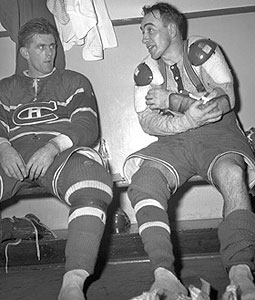
Richard recovered from his broken ankle for the 1941–42 season. He played 31 games for the Montreal Canadiens' minor league team and scored 17 points. Then he broke his wrist after crashing into the net. Richard returned for the playoffs. The Canadiens' main NHL team was losing players to the war. They also had a bad record and few French-speaking players. So, Richard got a tryout for the 1942–43 season. He signed a contract for $3,500 and wore jersey number 15. Richard scored his first NHL goal on November 8, 1942, against the New York Rangers.
Another injury ended Richard's first NHL season after only 16 games. He broke his leg. People wondered if he was too fragile for the NHL because of all his broken bones. He tried to join the military again, but was turned down. X-rays showed his bones hadn't healed well. His ankle was permanently changed, which made him skate differently. Feeling embarrassed, he trained harder. He was fully healthy for the 1943–44 season. When his daughter Huguette was born, Richard changed his jersey number to 9, matching her birth weight of nine pounds.
Richard stayed healthy and played in 46 of Montreal's 50 games. He led the Canadiens with 32 goals and had 54 points. This was his first full NHL season. It proved he could play in the league and showed he was one of the best young players. Coach Dick Irvin moved him from left wing to right wing. He put him on a line with Toe Blake and Elmer Lach. This group, known as the "Punch Line", was a powerful scoring team in the 1940s. The Canadiens lost only six games after October. They went on to win the team's first Stanley Cup in 13 years. Richard led the league with 12 playoff goals. This included scoring five goals in one game against the Toronto Maple Leafs. He tied an NHL record for goals in a playoff game. He was named the first, second, and third star of that game. Richard was named a second team All-Star after the season. He was named an all-star for 14 years in a row.
50 Goals in 50 Games
The 1944–45 NHL season was a record-breaking year for Richard. On December 28, 1944, he set a new record for points in one game. He scored five goals and had three assists in a 9–1 win over the Detroit Red Wings. His eight points broke the old record of seven. Richard did this even though he was tired from moving into his new home that afternoon. He kept scoring at an amazing rate. By February 1945, he was close to Joe Malone's 27-year-old NHL record of 44 goals in one season. Richard broke the record on February 25, 1945, in a 5–2 win against Toronto. Malone was there to give Richard the puck from his 45th goal.
As Richard got close to 50 goals for the season, opposing players tried harder to stop him. They would hit him with their sticks, hook him, and even hang on his back. Richard went eight games without scoring. He started Montreal's last regular season game on March 18 against the Boston Bruins with 49 goals. He finally reached 50 goals with 2:15 left in the game, a 4–2 Montreal win. He became the first player to score 50 goals in a season. This record stood until 1960–61, when Bernie Geoffrion also scored 50 goals. Richard's record of 50 goals in 50 games is still one of the most famous achievements in NHL history. Only four other players have matched it in over 70 years. Richard finished the season with 73 points. The Punch Line finished first, second, and third in league scoring. Richard came in second for the Hart Trophy, behind Lach.
Some people said Richard's scoring record was because many good players were away fighting in the war. When many players returned in 1945–46, he won his second Stanley Cup with Montreal. But his goal total dropped to 27. Richard scored many goals again in 1946–47. He led the league with 45 goals in a 60-game season. He won the Hart Memorial Trophy as the league's most valuable player for the only time in his career. Opponents kept trying to make Richard angry. They learned he could be provoked into fighting, which would take him out of the game. In the 1947 Stanley Cup Finals, Richard hit Toronto's Bill Ezinicki with his stick. Richard was suspended for the third game, which the Maple Leafs won.
Before the 1947–48 season, Richard asked for more money. General manager Frank J. Selke said no. Richard and team captain Émile Bouchard sat out the Canadiens' preseason games. But they came back when the season started. The Punch Line broke up after Blake got a career-ending leg injury. Richard's season also ended early because of a knee injury. He finished second in team scoring with 53 points in 53 games, but Montreal missed the playoffs. After scoring only 38 points in 1948–49, Richard had 65 points the next season. His 43 goals led the NHL for the third time. In 1950–51, Richard scored 42 goals. His 271st career goal made him Montreal's all-time leading goal scorer.
All-Time Scoring Leader
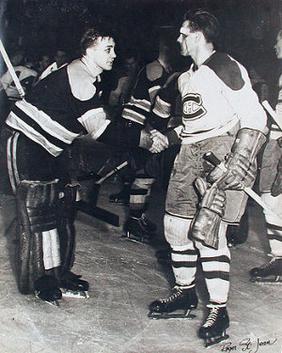
Richard missed over 20 games in the 1951–52 season due to injury. But he overcame another injury in the playoffs. In the final game of the semi-final against Boston, Richard was hit and briefly knocked out. He fell and hit his head on a player's knee. Even though he was clearly dazed, Richard returned to the game late in the third period after a cut above his eye was stitched. Canadiens coach Dick Irvin sent Richard back on the ice, even though he knew Richard had a concussion. Richard scored the winning goal in a 2–1 victory. This sent Montreal to the 1952 Stanley Cup Finals. After the game, a bloody and still dazed Richard was photographed shaking hands with Boston goaltender Jim Henry. This photo is one of the most famous images of Richard. In the finals, Montreal lost to Detroit in four straight games.
The 1952–53 season began with Richard chasing Nels Stewart's all-time NHL record of 324 goals. Richard tied the record in Toronto on October 29, 1952, by scoring two goals against the Maple Leafs. He got a huge cheer from Montreal's rival fans. He didn't score in his next three games as excited fans watched every game. In his fourth try, on November 8 against Chicago, Richard scored his 325th goal. The Montreal Gazette said the cheer Richard received from his fans "shook the rafters" of the Montreal Forum. He finished the season with 61 points and 28 goals, leading his team in both. He became the first player in NHL history to score at least 20 goals in his first ten full seasons. Richard scored 7 goals in 12 playoff games. The Canadiens defeated Boston in the 1953 Stanley Cup Finals to win Montreal's first Stanley Cup since 1946.
Richard led the league in goals for the fourth time in his career with 37 in 1953–54. Then he led for a fifth time in 1954–55 with 38 goals (tied with Bernie Geoffrion). He scored his 400th career goal on December 18, 1954, against Chicago.
The Richard Riot
Opposing players kept trying to stop Richard by being very physical. He often fought back just as hard. This led to ongoing disagreements with NHL President Clarence Campbell. Campbell had fined Richard many times for incidents on the ice. Richard and many people in Quebec believed that Campbell treated French Canadian players more harshly than English players. This tension exploded after an incident in the Canadiens' game against Boston on March 13, 1955. Hal Laycoe hit Richard in the head with his stick. Richard fought back by hitting Laycoe's head with his stick. Then he punched an official, Cliff Thompson, who tried to stop the fight. Boston police tried to arrest Richard for assault. But Montreal team staff and players stopped them.
After two days, Campbell announced that he had suspended Richard for the rest of the regular season and the playoffs. Richard was leading the NHL in scoring at the time. In English Canada, Campbell was praised for trying to control Richard. In French Quebec, the suspension was seen as unfair. It was viewed as a punishment given to a French-speaking hero by the English-speaking establishment. Richard's supporters were very angry at Campbell. He received death threats. At the next Canadiens game, angry fans threw vegetables, eggs, and other things at Campbell. One fan threw a tear gas bomb, which caused the Forum to be evacuated. The game was given to Detroit. Fans leaving the arena were met by a large group of protesters outside.
The crowd of over 20,000 people turned into a riot. Windows and doors were broken at the Forum and nearby stores. By the next morning, 65 to 70 people had been arrested. Over 50 stores were looted, and 37 people were injured. The damage was estimated at $100,000. Richard had been at the game, but left right after it was called off. Frank Selke tried to get him to come back to calm the crowd, but Richard refused. He feared he would make the crowd even angrier. The next day, he spoke on the radio asking for calm: "Do no more harm. Get behind the team in the playoffs. I will take my punishment and come back next year and help the club and the younger players to win the Cup."
The suspension cost Richard the Art Ross Trophy for leading the league in points. He lost to teammate Geoffrion by one point. Richard never won the point title, finishing second five times. Montreal fans booed Geoffrion when he passed Richard on the last day of the season. The fans continued to boo Geoffrion into the next season. Montreal reached the 1955 Stanley Cup Finals without Richard, but lost four games to three. This loss was very hard for Richard, who struggled to control his anger.
Captain of a Dynasty
Richard kept his promise to Canadiens fans. He led Montreal to a Stanley Cup championship in 1955–56. This was the start of an amazing record of five Stanley Cup victories in a row by one team. That season, his younger brother Henri joined the Canadiens. Henri was a center nicknamed the "Pocket Rocket." Also, his former Punch Line teammate, Toe Blake, returned as head coach. Blake and general manager Frank Selke worked with Richard to help him control his temper. They encouraged him to score goals instead of fighting. Richard finished the season with 38 goals and 71 points. He was second on the team in both categories to Jean Béliveau. Richard added 14 points in 10 playoff games as Montreal beat Detroit to win the Stanley Cup. He scored the winning goal in the fifth and final game, a 3–1 victory.
As he entered his 15th NHL season in 1956–57, Richard's teammates named him captain of the Canadiens. He took over from Émile Bouchard, who had retired. Richard scored 33 goals and 62 points, again finishing second on the team to Béliveau. In the playoffs, he scored the overtime-winning goal in the fifth game of the semi-final to eliminate New York. Then he scored four goals in a 5–1 win over Boston in the first game of the finals. Montreal won the series in five games, earning their second straight championship.
Richard reached a big scoring milestone early in the 1957–58 season. On October 19, 1957, during a 3–1 win over Chicago, he became the first player in NHL history to score 500 goals in his career. As Richard celebrated, the Montreal Forum crowd heard the announcement: "Canadiens' goal, scored by Mr. Hockey himself, Maurice Richard." He played only 28 regular season games that season, scoring 34 points. He missed three months because of a torn Achilles tendon. Richard returned for the playoffs. He led Montreal with 11 goals and 15 points as the team won its third straight Stanley Cup. He scored the overtime-winning goal in the fifth game of the finals against Boston. This was his sixth playoff overtime-winning goal and his third in the finals, both NHL records.
At 37, Richard was the oldest player in the NHL in 1958–59. He scored 38 points in 42 games, but missed six weeks with a broken ankle. Injuries continued to bother Richard during the 1959–60 season. He missed a month with a broken cheekbone. Despite his injuries, Montreal won the Stanley Cup in both seasons. Richard scored no points in four games in the 1959 Stanley Cup Finals. But he had a goal and three assists in 1960. These were Richard's seventh and eighth career titles. Montreal's five consecutive championships are still a record. The 1956–60 Canadiens are considered one of the greatest teams in NHL history.
Richard's last playoff goal was in 1960. On September 15, 1960, he announced he was retiring as a player. Richard had gone to Montreal's training camp that fall. But Frank Selke convinced him to retire, fearing he might get a serious injury. In his retirement speech, Richard said he had been thinking about leaving the game for two years. He said that at age 39, the game had become too fast for him. When Gordie Howe heard about Richard's retirement, he praised his former rival: "He sure was a drawing card. He brought in the crowds that helped pay our wages. Richard certainly has been one of the greatest players in the game and we will miss him."
Playing Style
Richard was first nicknamed "the Comet." Then, teammate Ray Getliffe said Richard "went in like a rocket" towards the goal. A sportswriter then called him "The Rocket." This nickname described Richard's speed, strength, and determination. Teammate and coach Toe Blake said the name fit because "when he would take off, nothing got in his way that could stop him." Goaltender Jacques Plante said it was one of the best nicknames for an athlete. He noted the fierce look in Richard's eyes, comparing it to "the rocket's red glare." Glenn Hall agreed: "What I remember most about Rocket was his eyes. When he came flying toward you with the puck on his stick, his eyes were all lit up, flashing and gleaming like a pinball machine. It was terrifying."
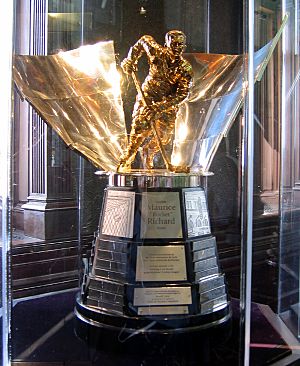
Richard played during a time when hockey was very physical and sometimes violent. Richard's own temper was well-known, as seen in the Richard Riot.
Richard was a pure goal-scorer. He wasn't known for fancy moves or passing. One teammate joked that "Maurice wouldn't even pass you the salt." Richard led the NHL in goals five times, but never in points. He was best known for skating quickly towards the net from the blue line. He was good at scoring with both his forehand and backhand shots. His exciting play helped make the Montreal Canadiens popular again after they struggled in the 1930s. Besides being named to post-season all-star teams 14 times, Richard played in 13 straight NHL All-Star Games between 1947 and 1959.
Richard was still playing when Gordie Howe passed his career points record. Howe later passed Richard's career goal record of 544 in 1963. Richard's record of 50 goals in one season stood for 20 years until Bobby Hull broke it in 1965. The Montreal Canadiens donated the Maurice "Rocket" Richard Trophy to the NHL in 1999. It is given each year to the league's top goal scorer.
Personal Life and Later Years
After he retired as a player, Frank Selke offered Richard a job as a team ambassador. He promised to pay him his full playing salary for the first year. Richard worked in this role for three years. In 1964, he was named a vice-president of the Canadiens. But he felt the role had no real power and was just for show. He resigned a year later. Richard became distant from the team because his wish to be involved was ignored. The distance grew when the Canadiens forced Frank Selke to retire in 1965. Richard eventually refused to let his name be used with the team.
Richard struggled to find a purpose after retiring. He also worried about being forgotten. So, he put his name on many different things. He was a consulting editor for a magazine called Maurice Richard's Hockey Illustrated. He owned a tavern in Montreal called the "544 / 9 Tavern" (named after his career goal total and jersey number). He also promoted many products, like beer, hair dye, car batteries, fishing gear, and children's toys. He continued to use his name for promotions for over 30 years after he retired. Richard briefly returned to hockey in 1972 as head coach for the Quebec Nordiques of the World Hockey Association. He only coached two games, winning one and losing one. He found he couldn't handle the stress of coaching. Richard made up with the Canadiens in 1981 and went back to being a team ambassador.
Richard and his wife, Lucille, lived in Montreal. They raised seven children: Huguette, Maurice Jr., Norman, André, Suzanne, Polo, and Jean. They had 14 grandchildren. Lucille passed away from cancer in 1994, two years after they celebrated their 50th wedding anniversary. Richard's companion later in his life was Sonia Raymond.
Illness and Death
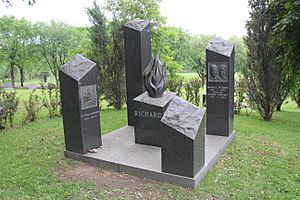
In 1998, it was announced that Richard had abdominal cancer. He passed away from the disease two years later on May 27, 2000. He was buried at the Notre Dame des Neiges Cemetery in Montreal. Before Game 1 of the 2000 Stanley Cup Finals, a short video honored Richard's great moments and legacy.
Legacy and Impact
Richard received many honors during and after his career. The Canadian Press named him its male athlete of the year three times. In 1957, Richard won the Lou Marsh Trophy as Canada's athlete of the year. The Canadiens retired his jersey number 9 in 1960. The Hockey Hall of Fame inducted him in 1961, without the usual five-year wait. That same year, the 5,000-seat Maurice Richard Arena was built and named after him.
When the Order of Canada was created in 1967, Richard was one of the first people to be named a member. In 1998, he was given the highest rank, Companion of the Order of Canada. Canada's Sports Hall of Fame honored him in 1975. Richard received a star on Canada's Walk of Fame in 1999. He was also appointed to the Queen's Privy Council for Canada in 1992.
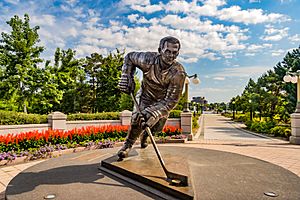
Richard was a popular player across Canada. But he was especially a hero in Quebec. Author Roch Carrier explained the strong feelings Richard created in his 1979 short story The Hockey Sweater. Carrier wrote how he and his friends all copied Richard's style: "we were five Maurice Richards against five other Maurice Richards, throwing themselves on the puck. We were ten players all wearing the uniform of the Montreal Canadiens, all with the same burning enthusiasm. We all wore the famous number 9 on our backs." This story and its animated short film helped make Richard a Canadian icon. Richard remained popular late in his life. When he was introduced at the final hockey game at the Montreal Forum, Canadiens fans gave him an 11-minute standing ovation, bringing him to tears. After his death, the province of Quebec honored Richard with a state funeral. This was the first time a non-politician received this honor in Quebec. Over 115,000 people paid their respects by viewing his body at the Molson Centre.
The Richard Riot has become a famous part of Canadian history. The riot is often seen as a sign of the unhappiness that French-speaking people in Quebec felt about their place in Canada. Some historians believe the riot was a start to the "Quiet Revolution" of the 1960s. Richard himself said he didn't see his role as a cause for cultural or political change. In a 1975 interview, he said he played with "English boys" and didn't know much about the situation in French Quebec at the time.
In his book The Rocket: A Cultural History of Maurice Richard, Benoît Melançon disagrees about how important the riot was. He says its importance grew over time as Richard's legend grew. Melançon wrote that some people like to say the riot was when Quebecers first stood up for themselves.
Richard is the subject of the 2005 movie The Rocket.
Career Statistics
| Regular season | Playoffs | |||||||||||||
|---|---|---|---|---|---|---|---|---|---|---|---|---|---|---|
| Season | Team | League | GP | G | A | Pts | PIM | GP | G | A | Pts | PIM | ||
| 1939–40 | Verdun Maple Leafs | QJHL | 10 | 4 | 1 | 5 | 2 | 4 | 6 | 3 | 9 | 2 | ||
| 1939–40 | Verdun Maple Leafs | QSHL | 1 | 0 | 1 | 1 | 0 | — | — | — | — | — | ||
| 1939–40 | Verdun Maple Leafs | Mem. Cup | — | — | — | — | — | 7 | 7 | 9 | 16 | 16 | ||
| 1940–41 | Montreal Canadiens (Sr.) | QSHL | 1 | 0 | 1 | 1 | 0 | — | — | — | — | — | ||
| 1941–42 | Montreal Canadiens (Sr.) | QSHL | 31 | 8 | 9 | 17 | 27 | 6 | 2 | 1 | 3 | 6 | ||
| 1942–43 | Montreal Canadiens | NHL | 16 | 5 | 6 | 11 | 4 | — | — | — | — | — | ||
| 1943–44* | Montreal Canadiens | NHL | 46 | 32 | 22 | 54 | 45 | 9 | 12 | 5 | 17 | 10 | ||
| 1944–45 | Montreal Canadiens | NHL | 50 | 50 | 23 | 73 | 46 | 6 | 6 | 2 | 8 | 10 | ||
| 1945–46* | Montreal Canadiens | NHL | 50 | 27 | 22 | 49 | 50 | 9 | 7 | 4 | 11 | 15 | ||
| 1946–47 | Montreal Canadiens | NHL | 60 | 45 | 26 | 71 | 69 | 10 | 6 | 5 | 11 | 44 | ||
| 1947–48 | Montreal Canadiens | NHL | 53 | 28 | 25 | 53 | 89 | — | — | — | — | — | ||
| 1948–49 | Montreal Canadiens | NHL | 59 | 20 | 18 | 38 | 110 | 7 | 2 | 1 | 3 | 14 | ||
| 1949–50 | Montreal Canadiens | NHL | 70 | 43 | 22 | 65 | 114 | 5 | 1 | 1 | 2 | 6 | ||
| 1950–51 | Montreal Canadiens | NHL | 65 | 42 | 24 | 66 | 97 | 11 | 9 | 4 | 13 | 13 | ||
| 1951–52 | Montreal Canadiens | NHL | 48 | 27 | 17 | 44 | 44 | 11 | 4 | 2 | 6 | 6 | ||
| 1952–53* | Montreal Canadiens | NHL | 70 | 28 | 33 | 61 | 112 | 12 | 7 | 1 | 8 | 2 | ||
| 1953–54 | Montreal Canadiens | NHL | 70 | 37 | 30 | 67 | 112 | 11 | 3 | 0 | 3 | 22 | ||
| 1954–55 | Montreal Canadiens | NHL | 67 | 38 | 36 | 74 | 125 | — | — | — | — | — | ||
| 1955–56* | Montreal Canadiens | NHL | 70 | 38 | 33 | 71 | 89 | 10 | 5 | 9 | 14 | 24 | ||
| 1956–57* | Montreal Canadiens | NHL | 63 | 33 | 29 | 62 | 27 | 10 | 8 | 3 | 11 | 8 | ||
| 1957–58* | Montreal Canadiens | NHL | 28 | 15 | 19 | 34 | 28 | 10 | 11 | 4 | 15 | 10 | ||
| 1958–59* | Montreal Canadiens | NHL | 42 | 17 | 21 | 38 | 27 | 4 | 0 | 0 | 0 | 2 | ||
| 1959–60* | Montreal Canadiens | NHL | 51 | 19 | 16 | 35 | 50 | 8 | 1 | 3 | 4 | 2 | ||
| NHL totals | 978 | 544 | 422 | 966 | 1,285 | 133 | 82 | 44 | 126 | 188 | ||||
* Stanley Cup Champion.
Awards and Honours
| Award | Year | Ref. |
|---|---|---|
| First team All-Star | 1944–45, 1945–46, 1946–47, 1947–48, 1948–49, 1949–50, 1954–55, 1955–56 |
|
| Second Team All-Star | 1943–44, 1950–51, 1951–52, 1952–53, 1953–54, 1956–57 |
|
| 8x Stanley Cup champion | 1943–44, 1945–46, 1952–53, 1955–56, 1956–57, 1957–58, 1958–59, 1959–60 | |
| Hart Trophy Most valuable player |
1946–47 |
| Award | Year | Ref. |
|---|---|---|
| Canadian Press male athlete of the year | 1952, 1957 1958 |
|
| Lou Marsh Trophy Canadian athlete of the year |
1957 |
Images for kids
See also
 In Spanish: Maurice Richard para niños
In Spanish: Maurice Richard para niños
- List of family relations in the NHL
- List of players with five or more goals in an NHL game
Archives
There is a Maurice Richard fonds at Library and Archives Canada. The archival reference number is R9534.
 | Bessie Coleman |
 | Spann Watson |
 | Jill E. Brown |
 | Sherman W. White |


